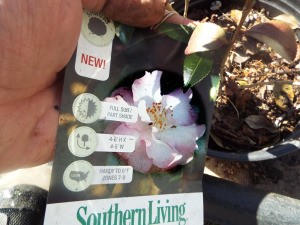
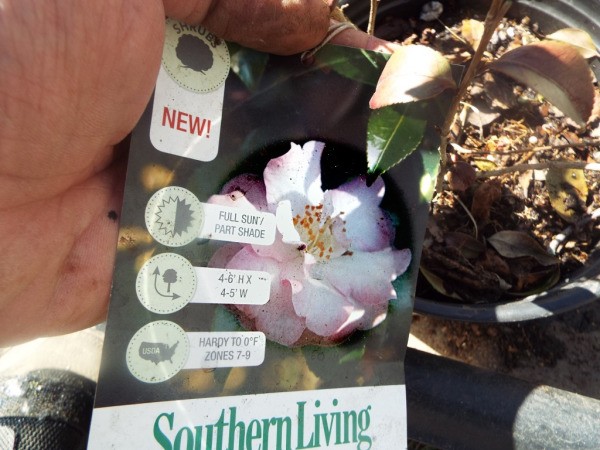
The above picture is of a new variety of camellia. If I am correct, it is one of a series called 'October Magic', this particular variety being named 'Orchid'.
Most camellias bloom late winter to early spring.This plant is said to bloom in fall, at a time when there is little else in bloom. I like that.
As might be expected, a new variety of anything is going to cost more than the old standbys. The original price on this 'gallon' size plant was $18.00. I saw it reduced to $2.50 and grabbed it up.
With it being a new variety, I guess there is not an overabundance of them at this time. There was only one plant in the pot.
Being greedy, I searched for more bargains. I found another marked down pot. The original price was $14.00, reduced to $2.50. In the pot was an unnamed variety of Sasanqua camellia. I'm not keen on buying unnamed varieties of anything. I made an exception in this case. There were two plants in the pot instead of one!
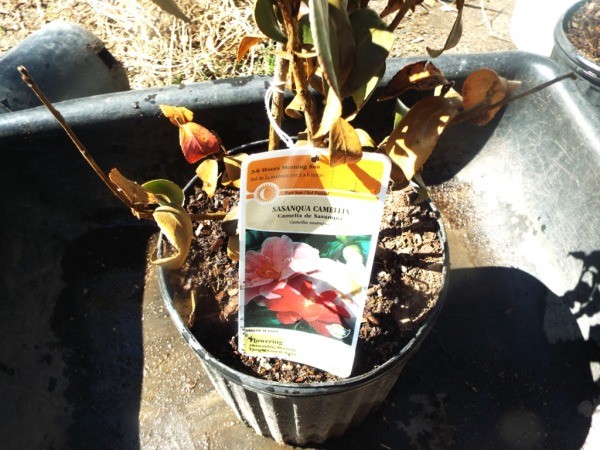
Still controlled by greed, I searched more. I found another bargain. Another camellia with the original price of $6.98 was reduced to $1.00. Should I get it? It's a shade of red I don't particularly care for. Heck, for a dollar, I can't go wrong. Not to mention, there were 5 plants in that small pot!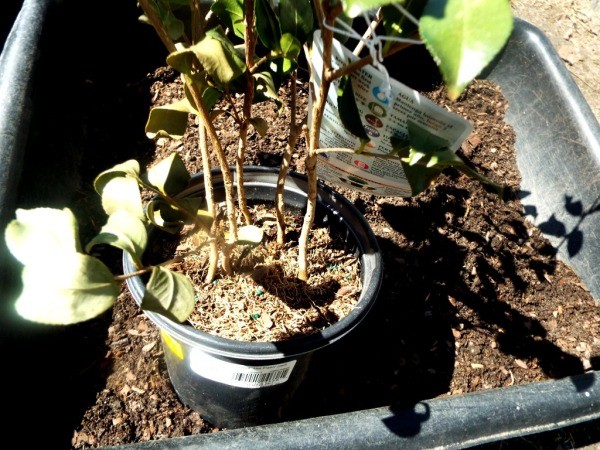
It's not uncommon to find two plants in a pot when buying shrubs these days, but five? I can't imagine what the nurseryman was thinking. Figuring the plants were pot bound, I went to work.
It took some doing to get those five plants separated. The roots were too long for the pot, even if there had been only one plant. Five plants with their roots all entangled together with nowhere to go. Sad.
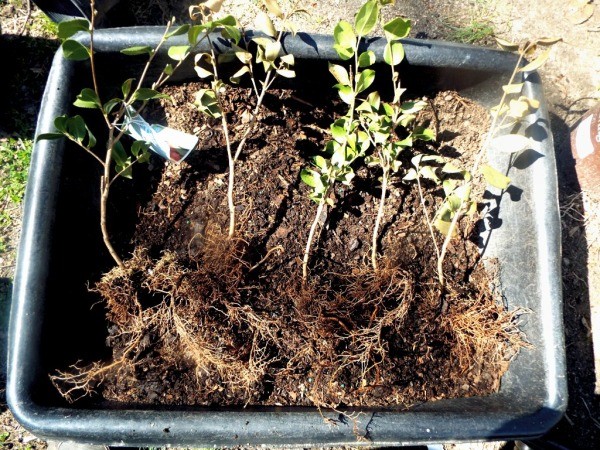
Each plant got its own pot, filled with a rich medium high in compost and fine pine bark for good drainage.
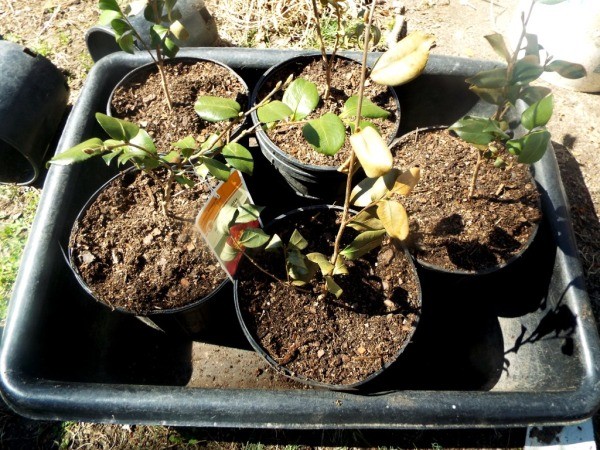
But really now, what good is a nice home for a plant if it looks as if it's going to die or looks dead already?
Two of the plants in the pot looked dead. The other three looked as if they would follow suit any day. As much as I love plants (and bargains), why bother to bring this pot home? Well, all things are not as they seem.
A long time ago, I learned a trick from the old timers. Though not foolproof, it works most of the time. I use it a lot as I buy a lot of 'iffy' plants.
When unsure if a plant is alive, use your fingernail to scrape away a tiny area of the thinnest outermost layer of the bark. If you see a rich, moist green, the plant is most likely alive. If there is no green or if the green is pale and dry looking, the plant is most likely dead. I performed this little test before I brought the pot home. I am confident all five plants will live and thrive.
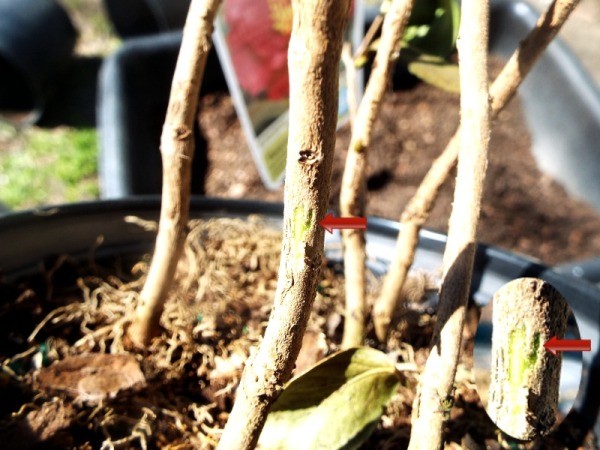
If you try this test instore, be discreet. But do know that if done properly, you will cause no harm to the plant. You are not injuring a plant someone else might buy.
So, the five Camellias in the pot were a color I didn't like. Was there any other reason not to buy the pot? Yes! Though I did buy the pot, I was turned off right away by the name of the camellia. It may as well have been named 'Menopausal Camellia' They came close when they named it 'Hot Flash".
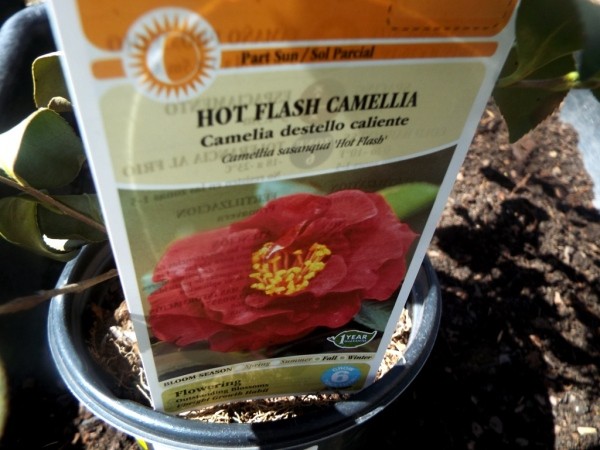
Lord, lord. Quick! Somebody find my bottle of Lydia E. Pinkham's Compound!
Oh well, I can't complain too much. A dollar for the pot. Five plants in the pot. Five plants that could live for a hundred years, bringing someone a lot of pleasure, all for 20 cents each.
Yes!
Here are the questions asked by community members. Read on to see the answers provided by the ThriftyFun community.
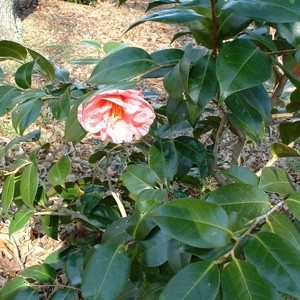 Can anyone tell me what this flower is?
Can anyone tell me what this flower is?
Thanks.
By Becky from Salisbury, MD
It's a sasanquah camellia.
Is it possible to start a camellia from a cutting? And if so, how do I proceed? Do I use new growth? Please share your advice. It will be most appreciated.
By R Barbara
Camelias are rooted from tip cuttings in June (just past the real new growth and below a nub). Take your cuttings and put them in a container with soil that drains good (vermiculite or styrofoam pebbles work to let it drain good.)
Keep the soil moist but not wet and take more cuttings than you need because it is your first try. If they don't root then next spring before the buds open cut some with old growth and place in bark and sand mixture keep moist but let dry out a little in between and that works for me.
google: rooting camelia cuttings and you'll have ample ideas.
I did it a little differently than the other person posted. I took end cuttings, put them in little pots with a good loose potting soil. I used Rootone as well to encourage root growth. I then placed all of the little pots in a tray inside a large clear plastic bag which I tied at the top after watering the cuttings. This was to maintain 100% humidity. That was in February here in California. I then placed them on a table near a window and never had to water them again.
What type of soil do camellia plants like?
Hardiness Zone: 7a
By Dianne Derksen from Vancouver Island. B.C. Canada
Camellia growers seldom get into trouble from using organic soil amendments such as peat, well rotted sawdust or bagasse. Frequently it is desirable to supplement these organics with mineral fertilizer or to add other organics such as cottonseed meal.
A mixture that has worked well on neutral to slightly alkaline soils is made up of 5 parts (by weight) of cottonseed meal, 3 parts of superphosphate, and 2 parts of sulphate of potash. This mixture became quite popular and was commonly but erroneously been called a 5-3-2 mixture; actually it is more nearly a 3-6-12 mixture that is, contains about 3 per cent nitrogen, 6 per cent phosphoric acid and 12 per cent potash.
Even this formula should be used in small quantities not over 2 pounds to each 100 square feet once each year, usually about six weeks before the approximate date when growth starts. In the South Atlantic and Gulf Coast sections new growth begins, in normal seasons, about March 15, so that the fertilizer should he applied about February 1 to 15. No hard and fast rule can be laid down, however, and it may be necessary to increase or decrease the dosage of either fertilizer to meet individual soil requirements.
Good luck.
I live in the south east of England. I have a camellia shrub in a tub in the garden. I think it needs a feed and as sequestrian iron tonic is expensive, does anyone have a cheaper alternative?
By Diane CS
My camellia has some leaves that are turning brown. I asked the gardener if he knew what it was? He thought it was bugs, but I had it checked out and it's not. What should I do?
Hardiness Zone: 9a
By Elaine from The Villages, FL
Check out these photos.
This is one of my favorite varieties of camellia. It was an inexpensive plant from the Home Depot. The garden has probably 5-6 shrubs that have all grown tall enough to see over the fence from the walkway.